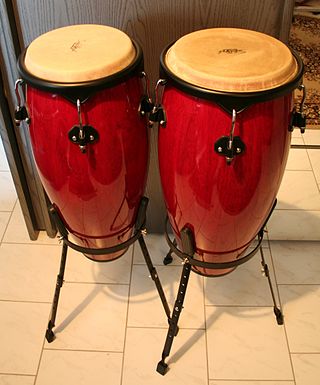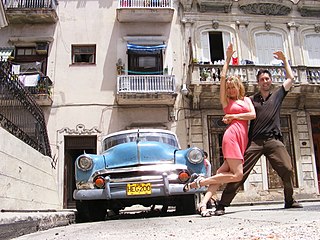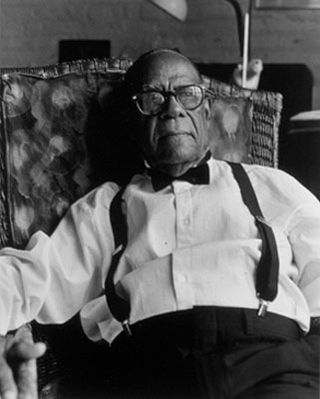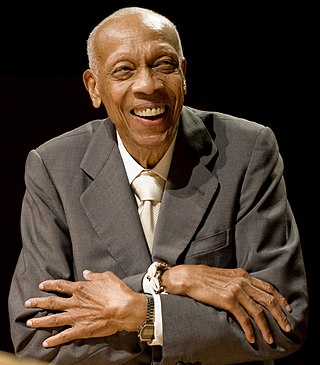Afro-Cubans are Cubans who are of Black African ancestry. The term may also refer to:
Jazz is a music genre that originated in the African-American communities of New Orleans, Louisiana, in the late 19th and early 20th centuries, with its roots in blues and ragtime. Since the 1920s Jazz Age, it has been recognized as a major form of musical expression in traditional and popular music. Jazz is characterized by swing and blue notes, complex chords, call and response vocals, polyrhythms and improvisation. Jazz has roots in European harmony and African rhythmic rituals.
Rhythm and blues, frequently abbreviated as R&B or R'n'B, is a genre of popular music that originated in African-American communities in the 1940s. The term was originally used by record companies to describe recordings marketed predominantly to urban African Americans, at a time when "urbane, rocking, jazz based music ... [with a] heavy, insistent beat" was becoming more popular. In the commercial rhythm and blues music typical of the 1950s through the 1970s, the bands usually consisted of a piano, one or two guitars, bass, drums, one or more saxophones, and sometimes background vocalists. R&B lyrical themes often encapsulate the African-American experience of pain and the quest for freedom and joy, as well as triumphs and failures in terms of relationships, economics, and aspirations.

Salsa music is a style of Latin American music. Because most of the basic musical components predate the labeling of salsa, there have been many controversies regarding its origin. Most songs considered as salsa are primarily based on son montuno, with elements of mambo, Latin jazz, bomba, plena and guaracha. All of these elements are adapted to fit the basic son montuno template when performed within the context of salsa.

Jazz fusion is a music genre that developed in the late 1960s when musicians combined jazz harmony and improvisation with rock music, funk, and rhythm and blues. Electric guitars, amplifiers, and keyboards that were popular in rock and roll started to be used by jazz musicians, particularly those who had grown up listening to rock and roll.
Latin jazz is a genre of jazz with Latin American rhythms. The two main categories are Afro-Cuban jazz, rhythmically based on Cuban popular dance music, with a rhythm section employing ostinato patterns or a clave, and Afro-Brazilian jazz, which includes samba and bossa nova.

Jesús Valdés Rodríguez, better known as Chucho Valdés, is a Cuban pianist, bandleader, composer and arranger whose career spans over 50 years. An original member of the Orquesta Cubana de Música Moderna, in 1973 he founded the group Irakere, one of Cuba's best-known Latin jazz bands.

Timba is a Cuban genre of music based on Cuban son with salsa, American R&B/Funk and the strong influence of Afro-Cuban folkloric music. Timba rhythm sections differ from their salsa counterparts, because timba emphasizes the bass drum, which is not used in salsa bands. Timba and salsa use the same tempo range and they both use the standard conga marcha. Almost all timba bands have a trap drummer. Timbas also often break the basic tenets of arranging the music in-clave. Timba is considered to be a highly aggressive type of music, with rhythm and "swing" taking precedence over melody and lyricism. Associated with timba is a radically sexual and provocative dance style known as despelote. It is a dynamic evolution of salsa, full of improvisation and Afro Cuban heritage, based on son, Rumba and mambo, taking inspiration from Latin jazz, and is highly percussive with complex sections. Timba is more flexible and innovative than salsa, and includes a more diverse range of styles. Timba incorporates heavy percussion and rhythms which originally came from the barrios of Cuba.

Ramón "Mongo" Santamaría Rodríguez was a Cuban percussionist and bandleader who spent most of his career in the United States. Primarily a conga drummer, Santamaría was a leading figure in the pachanga and boogaloo dance crazes of the 1960s. His biggest hit was his rendition of Herbie Hancock's "Watermelon Man", which was inducted into the Grammy Hall of Fame in 1998. From the 1970s, he recorded mainly salsa and Latin jazz, before retiring in the late 1990s.
Afro-Cuban jazz is the earliest form of Latin jazz. It mixes Afro-Cuban clave-based rhythms with jazz harmonies and techniques of improvisation. Afro-Cuban music has deep roots in African ritual and rhythm. Afro-Cuban jazz emerged in the early 1940s with the Cuban musicians Mario Bauzá and Frank Grillo "Machito" in the band Machito and his Afro-Cubans in New York City. In 1947, the collaborations of bebop trumpeter Dizzy Gillespie and percussionist Chano Pozo brought Afro-Cuban rhythms and instruments, such as the tumbadora and the bongo, into the East Coast jazz scene. Early combinations of jazz with Cuban music, such as "Manteca" and "Mangó Mangüé", were commonly referred to as "Cubop" for Cuban bebop.
Palo may refer to:

Machito was a Latin jazz musician who helped refine Afro-Cuban jazz and create both Cubop and salsa music. He was raised in Havana with the singer Graciela, his foster sister.

Prudencio Mario Bauzá Cárdenas was an Afro-Cuban jazz, Latin, and jazz musician. He was among the first to introduce Cuban music to the United States by bringing Cuban musical styles to the New York City jazz scene. While Cuban bands had had popular jazz tunes in their repertoire for years, Bauzá's composition "Tangá" was the first piece to blend jazz harmony and arranging technique, with jazz soloists and Afro-Cuban rhythms. It is considered the first true Afro-Cuban jazz or Latin jazz tune.
Ethno jazz, also known as world jazz, is a subgenre of jazz and world music, developed internationally in the 1950s and '60s and broadly characterized by a combination of traditional jazz and non-Western musical elements. Though occasionally equaled to or considered the successor of world music, an independent meaning of ethno jazz emerged around 1990 through the commercial success of ethnic music via globalization, which especially observed a Western focus on Asian musical interpretations. The origin of ethno jazz has widely been credited to saxophonist John Coltrane.

Dionisio Ramón Emilio Valdés Amaro, better known as Bebo Valdés, was a Cuban pianist, bandleader, composer and arranger. He was a central figure in the golden age of Cuban music, especially due to his big band arrangements and compositions of mambo, chachachá and batanga, a genre he created in 1952.

Armando Peraza was a Latin jazz percussionist and a member of the rock band Santana. Peraza played congas, bongos, and timbales.
Arturo "Chico" O'Farrill was a Cuban composer, arranger, and conductor, best known for his work in the Latin idiom, specifically Afro-Cuban jazz or "Cubop", although he also composed traditional jazz pieces and even symphonic works.

Francisco Aguabella was an Afro-Cuban percussionist whose career spanned folk, jazz, and dance bands. He was a prolific session musician and recorded seven albums as a leader.

Descemer Bueno is a Cuban singer, songwriter, and record producer. His first professional gigs were playing bass with Cuban troubadour Santiago Feliú.

Arturo O'Farrill is a jazz musician, the son of Latin jazz musician, arranger and bandleader Chico O'Farrill, and pianist, composer, and director for the Afro Latin Jazz Orchestra. He is best known for his contributions to contemporary Latin jazz, having received Grammy Awards and nominations, though he has trained in other forms such as free jazz and experimented briefly with hip hop.

A Toda Cuba le Gusta is the first studio album by the Afro-Cuban All Stars, produced by Cuban bandleader and musician Juan de Marcos González and Nick Gold, and released on April 9, 1997 on World Circuit Records.